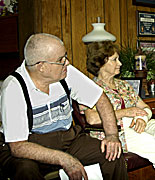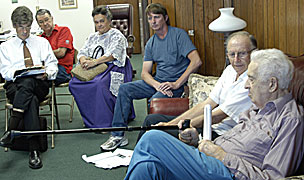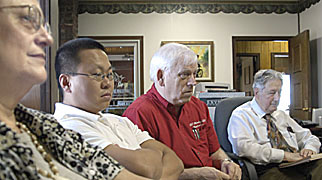About 5300 signatures are needed to force a referendum at a special election or 15 per cent of the number who voted in the last municipal election. It is not clear whether the group can meet the deadline for filing a referendum for the scheduled general election in November which would bring the number of needed petition signatures down to 10%.
Clyde Black announced that in one day he already has 100 co-workers from Gulf States Paper Corp. committed to signing the petition. Black had tried to argue with the council at their August 16th meeting that since they hadn't protected him from chemical contamination at Eagle-Picher, they shouldn't be trying to protect his teeth from cavities.

"We need to let the people decide," said Carlo P. Duncan, (pictured left) one of the other community members who spoke in opposition to fluoridation at the public hearing. In spite of a 2003 survey which revealed that 68 per cent of the residents favored a referendum to decide the issue, all of the council members but Jon Tupper (zone 4) decided to pass a bill in support of it without requiring a public vote.
Several people adamantly opposed to allowing the council to make a decision regarding what was put in their drinking water, and, consequently, their bodies, volunteered to go door-to-door with the petitions. Others planned to seek signatures in public places.
Dr. Alan Clark of Carthage, a general practitioner on the staff of Mercy St. John's Health System, in Springfield, lent his support to the group. Clark, who is extremely well published in various fields, emcees a radio show, "St John's Health Hints" on KSGF, 1260 am, Springfield. He also answers questions put to him by viewers of the St. John's website.
Calling fluoridation an important issue, Clark said it was necessary for the community to have the right to voice what is put in the public water supply. The council accepted a one-sided argument in favor of fluoridation without hearing the voice of its opposition, he said.
"When people learn they have been misled by medical resources as to the toxicity of chemicals, they will shy away. It will be damaging to the public confidence," he said. He gave fluoride, mercury and lead as examples of toxic chemicals.
 Dr. Fred King, pointing with cane, is emphasing his opposition to putting fluoride in the water supply. King, now 90, led the fight in the 60s and late 80s to keep the chemical out of the water. He's back, he says, to do whatever is necessary to inform the public of the dangers of fluoridation. Also pictured, L-R, is Dr. Alan Clark, Earl Jenness, Bonnie J. Clayton, Clyde Black and Gilbert Millner.
Dr. Fred King, pointing with cane, is emphasing his opposition to putting fluoride in the water supply. King, now 90, led the fight in the 60s and late 80s to keep the chemical out of the water. He's back, he says, to do whatever is necessary to inform the public of the dangers of fluoridation. Also pictured, L-R, is Dr. Alan Clark, Earl Jenness, Bonnie J. Clayton, Clyde Black and Gilbert Millner.
Clark is scheduled to testify before the Government Reform and Oversight Committee headed by Dan Burton (R-Ind.) September 7-8, 2004 regarding the danger of putting thimerosol preservative in vaccines. The use of thimerosol was banned by the FDA in 1998 in any over-the-counter drugs. However, the Center for Disease Control has neglected to recognize the fact that it is an ingredient of many vaccines given to both children (DTP, MMR, Hepatitus B) and adults (flu shots). Clark supports HB4169 which seeks a national ban on thimerosol or ethyl mercury, which has been linked to an increase in autism in children. This bill, with certain exemptions, beginning July 1, 2006, prohibits a person who is pregnant or who is under three years of age from being vaccinated with a mercury-containing vaccine that contains more than 0.5 micrograms of mercury per 0.5 milliliter dose.
Thimerosol is just another example of chemicals, like fluoride, that had been widely accepted for ingestion. Many state legislators are now taking studies seriously that show their link to harmful outcomes.
At the request of the Environmental Protection Agency, the National Academies' National Research Council (NRC) has begun another review of the problems of water fluoridation. The Toxicologic Risk of Fluoride in Drinking Water (Project ID # BEST-K-2-05-A) is chaired by John Doull, M.D., Ph.D., professor emeritus of pharmacology and toxicology at the University of Kansas Medical School. Results from this year-long study should be published in November 2004.
Serving on this board of 12 is Dr. Hardy Limeback, BSc, PhD, DDS, associate professor and head of preventative dentistry, University of Toronto. Limeback has come to this conclusion regarding fluoridation of the public water supplies:
The major reasons for the general decline of tooth decay worldwide, both in non-fluoridated and fluoridated areas, is the widespread use of fluoridated toothpaste, improved diets, and overall improved general and dental health (antibiotics, preservatives, hygiene etc).
There is now a better understanding of how fluoride prevents dental decay. What little benefit fluoridated water may still provide is derived primarily through topical means (after the teeth erupt and come in contact with fluorides in the oral cavity). Fluoride does not need to be swallowed to be effective. It is not an essential nutrient. Nor should it be considered a desirable `supplement' for children living in non-fluoridated areas. Fluoride ingestion delays tooth eruption and this may account for some of the differences seen in the past between fluoridated and non-fluoridated areas (i.e. dental decay is simply postponed). No fluoridation study has ever separated out the systemic effects of fluoride. Even if there were a systemic benefit from ingestion of fluoride, it would be miniscule and clinically irrelevant. The notion that systemic fluorides are needed in non-fluoridated areas is an outdated one that should be abandoned altogether.
 L-R are Carolyn English, Jeffery Johnson, W.L. Walmsley and Geoffrey Hilton who were a part of the Committee for Pure Water which met in Walmsley's office on Joplin St. Many were there to fight the Establishment that doesn't see both sides of an issue.
L-R are Carolyn English, Jeffery Johnson, W.L. Walmsley and Geoffrey Hilton who were a part of the Committee for Pure Water which met in Walmsley's office on Joplin St. Many were there to fight the Establishment that doesn't see both sides of an issue.
Some members of the Joplin council jumped to the conclusion that the pro-fluoride side headed by Cindy Phillips, head of Operation: Smiles and Dr. Timothy O'Keefe had documentation that was "pure science," while the opposition used arguments that were "pure quackery." While former mayor Richard Russell called attention to the website of Dr. Stephen Barratt, a psychiatrist, called Quackwatch.com as justification for denouncing the opposing arguments, Millner countered with his belief that Barratt supports mainstream medicine often supported by drug company money and which, on occasion, runs contrary to the welfare of the people.
"It wouldn't be scare tactics to suggest that physicians often over-medicate their patients causing unnecessary harm. The people already know that," Millner said.
While the Committee for Pure Water is hoping that the council will look more carefully at, and take more seriously, the latest arguments against fluoridation, they also hope to get enough signatures to force a vote of the people that will overturn the council's decision.
"1776 is over. We done won the battle," said Earl Jenness in reference to the people's right to have a say in how they live their lives.
For a prior article, click here.






Comments